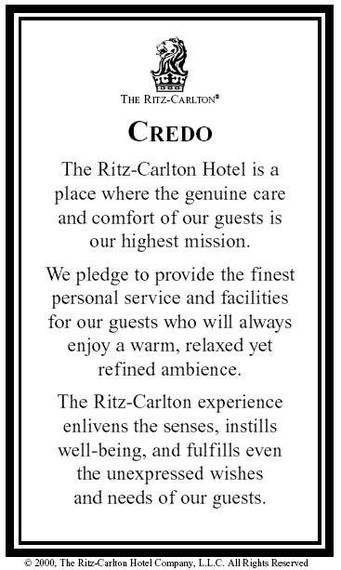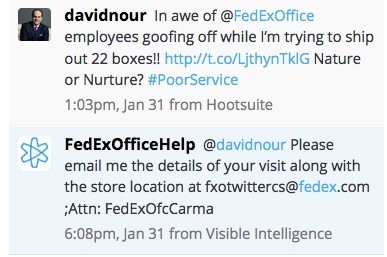When it comes to strategic relationships, I'm particularly curious about where excellence comes from. Is it nature or nurture?
Two recent customer service experiences stand out. On the positive end of the scale: I was speaking at a Ritz-Carlton to about 400 executives. And on this particular day, I was wearing black slacks. At breakfast, I asked one of the wait staff for a black napkin because I wanted to avoid the lint a white napkin can leave behind. Sure enough, she quickly brought me a black one.

Ritz-Carlton Credo! Do you have and instill similar core values in your team?
After breakfast, I gave my speech, and then the group came back to the dining hall for lunch. I'm just one of nearly four hundred people, but that staff member was standing with a black napkin on a platter at the entrance, waiting for me. I could not have been more pleased, with her and with Ritz-Carlton. Was it in her nature, her DNA, to anticipate a customer's needs like that? Or was it Ritz-Carlton's training?
Then a few days later I experienced the other end of the spectrum--the most negative customer service experience I've encountered in quite a while--again, related to public speaking. This time, it had to do with shipping my books to two different upcoming speaking engagements.
On a rainy, nasty Sunday afternoon my son and I packed and loaded 22 boxes of books into my SUV. We take time out of a busy weekend to find a FedEx office location. My son and I walked in, and the place is completely empty except for two employees, a man, and a woman. He is doing something with the cash register. She is doing absolutely nothing as far as I could tell, but it must have been quite absorbing to her because she ignores us, as if we were invisible.
I speak to her: "I'm trying to ship these books." "Do you have the forms?" she says. I didn't. She hands me a stack of forms, and then literally starts to joke around with her fellow employee. I finish the 22 forms and then I find myself waiting for their attention, even though there is nobody else in the store.
What is their behavior saying? The customer is an afterthought. Administrative work takes precedence. Minimize the labor intensity by having a customer do all the work. Having fun matters more than taking care of that customer.
So whether it's customer experience, or by extension any strategic relationship, what is the difference between the Ritz-Carlton wait staff and the FedEx Office workers? Is it nature? Are individuals just born with either an innate aptitude to serve or to ignore?
Or is it nurture? Is it, in effect, the training, the expectations that have been set, the metrics, the compensation that created the difference between those two scenarios? That made the Ritz- Carlton experience is so superior to FedEx Office?
My perception is that a talent for strategic relationships is really a hybrid of nature and nurture, particularly in high touch, high care environments. As an employer, you have to proactively seek people who have this nurturing, caring DNA about them. I would surmise that upbringing had a lot to do with it--being raised by people who demonstrate service to others. You internalize that from an early age.
But I also believe that ongoing training, development, metrics, compensation, also influence that orientation toward service. Almost all companies have new hire training, but too much of it is "we'll bring you in, teach you the products, the services, the markets, then wish you well and send you forth."
That represents a flawed assumption that training and development is an event. It's not: it's a process. Once you've taught someone what to do, you need to inspect it, to measure it, to reward superior performance. Compensation drives behavior. What are the carrot and stick? Is there a bonus?
Just as important, is there a structure to capture the voice of the customer in real time? Not some stale survey later, but a real-time capture of customers' feedback, and commitment to act on it. After my FedEx Office experience, I tweeted my awe at their team's complete failure to serve me. To their credit
FedEx Office replied back, "Please email me the details of your visit along with the store location and address." Kudos to them for being on top of their social channels, on a weekend.
Now, what's going to happen with that information? I'm really curious. Do I want somebody fired? No. Do I want the Ritz-Carlton woman to receive a bonus? Yes. And am I telling that story everywhere I go? Yes. If the Ritz-Carlton staff member took the initiative to remember my napkin, absolutely make her the head trainer. Have her teach others what she does and how she does it. Compare that to FedEx Office where, by the way, the male clerk, who was probably 6'2'', 240 lbs, never asked, "Can I help you?" Me and my 11-year-old son are dragging 22 boxes in out of the rain. It would have been nice to be asked.
So to come full circle: every customer encounter is an opportunity to elevate your brand or to dilute it. Hire, train, monitor and compensate behavior that, through that magical blend of nature or nurture, delivers great experiences. Outstanding service experiences build advocates, if not outright evangelists.
Nour Takeaways
1. Great customer experiences come from a blend of nature and nurture--a "DNA" of service to others, and training processes that cultivate caring.
2. To create brand-worthy service excellence, training has to be an ongoing process, not a "one and done" onboarding even.
3. Strategic relationships (which is what service excellence is all about) have to be measured, with rewards for outstanding performance.
David Nour is an enterprise growth strategist and the thought leader on Relationship Economics® --the quantifiable value of business relationships. In a global economy that is becoming increasingly disconnected, The Nour Group, Inc. has attracted consulting engagements from over 100 marquee organizations in driving unprecedented growth through unique return on their strategic relationships. Nour has pioneered the phenomenon that relationships are the greatest off balance sheet asset any organizations possesses, large and small, public and private. He is the author of several books including the best-selling Relationship Economics-- Revised (Wiley), ConnectAbility (McGraw-Hill), The Entrepreneur's Guide to Raising Capital (Praeger) and Return on Impact--Leadership Strategies for the Age of Connected Relationships (ASAE). Learn more at the Nour Group.com.


